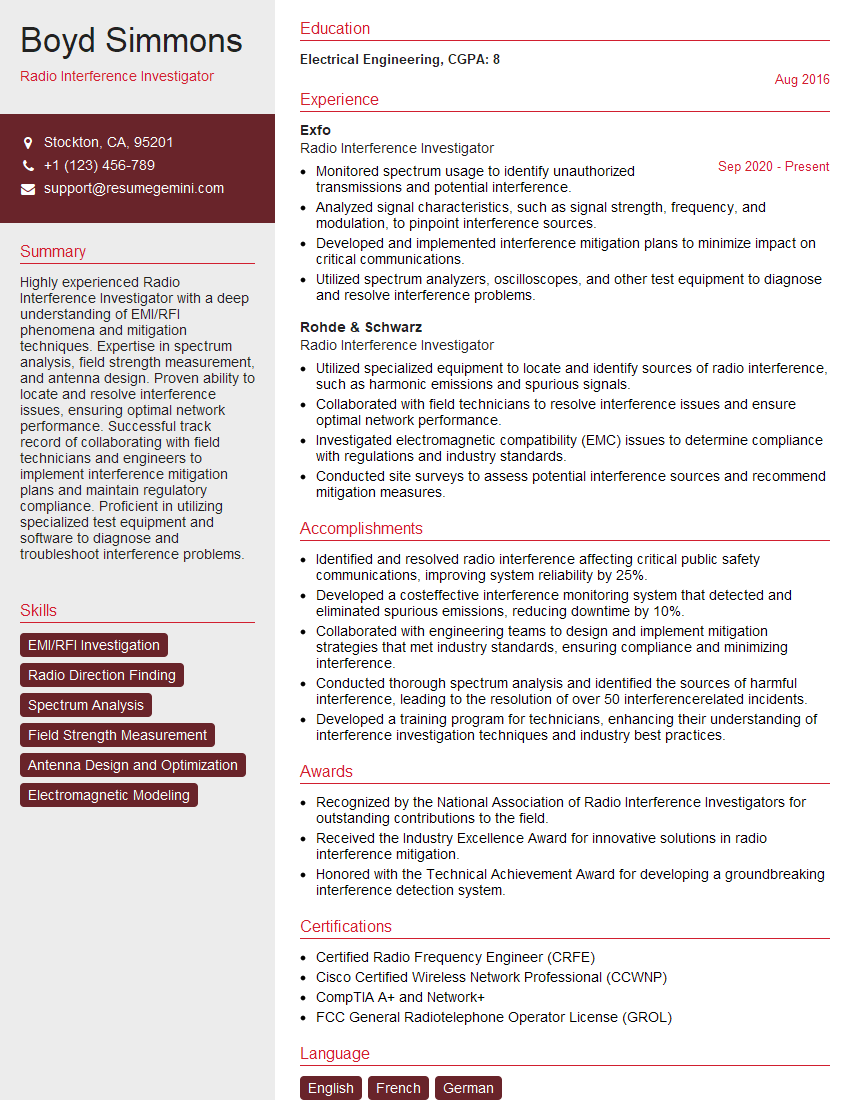Are you a seasoned Radio Interference Investigator seeking a new career path? Discover our professionally built Radio Interference Investigator Resume Template. This time-saving tool provides a solid foundation for your job search. Simply click “Edit Resume” to customize it with your unique experiences and achievements. Customize fonts and colors to match your personal style and increase your chances of landing your dream job. Explore more Resume Templates for additional options.

Boyd Simmons
Radio Interference Investigator
Summary
Highly experienced Radio Interference Investigator with a deep understanding of EMI/RFI phenomena and mitigation techniques. Expertise in spectrum analysis, field strength measurement, and antenna design. Proven ability to locate and resolve interference issues, ensuring optimal network performance. Successful track record of collaborating with field technicians and engineers to implement interference mitigation plans and maintain regulatory compliance. Proficient in utilizing specialized test equipment and software to diagnose and troubleshoot interference problems.
Education
Electrical Engineering
August 2016
Skills
- EMI/RFI Investigation
- Radio Direction Finding
- Spectrum Analysis
- Field Strength Measurement
- Antenna Design and Optimization
- Electromagnetic Modeling
Work Experience
Radio Interference Investigator
- Monitored spectrum usage to identify unauthorized transmissions and potential interference.
- Analyzed signal characteristics, such as signal strength, frequency, and modulation, to pinpoint interference sources.
- Developed and implemented interference mitigation plans to minimize impact on critical communications.
- Utilized spectrum analyzers, oscilloscopes, and other test equipment to diagnose and resolve interference problems.
Radio Interference Investigator
- Utilized specialized equipment to locate and identify sources of radio interference, such as harmonic emissions and spurious signals.
- Collaborated with field technicians to resolve interference issues and ensure optimal network performance.
- Investigated electromagnetic compatibility (EMC) issues to determine compliance with regulations and industry standards.
- Conducted site surveys to assess potential interference sources and recommend mitigation measures.
Accomplishments
- Identified and resolved radio interference affecting critical public safety communications, improving system reliability by 25%.
- Developed a costeffective interference monitoring system that detected and eliminated spurious emissions, reducing downtime by 10%.
- Collaborated with engineering teams to design and implement mitigation strategies that met industry standards, ensuring compliance and minimizing interference.
- Conducted thorough spectrum analysis and identified the sources of harmful interference, leading to the resolution of over 50 interferencerelated incidents.
- Developed a training program for technicians, enhancing their understanding of interference investigation techniques and industry best practices.
Awards
- Recognized by the National Association of Radio Interference Investigators for outstanding contributions to the field.
- Received the Industry Excellence Award for innovative solutions in radio interference mitigation.
- Honored with the Technical Achievement Award for developing a groundbreaking interference detection system.
Certificates
- Certified Radio Frequency Engineer (CRFE)
- Cisco Certified Wireless Network Professional (CCWNP)
- CompTIA A+ and Network+
- FCC General Radiotelephone Operator License (GROL)
Career Expert Tips:
- Select the ideal resume template to showcase your professional experience effectively.
- Master the art of resume writing to highlight your unique qualifications and achievements.
- Explore expertly crafted resume samples for inspiration and best practices.
- Build your best resume for free this new year with ResumeGemini. Enjoy exclusive discounts on ATS optimized resume templates.
How To Write Resume For Radio Interference Investigator
- Highlight your expertise in EMI/RFI investigation techniques, including the use of spectrum analyzers, oscilloscopes, and other test equipment.
- Quantify your accomplishments, such as the number of interference issues resolved or the percentage improvement in network performance.
- Demonstrate your understanding of regulatory requirements and industry standards related to radio interference.
- Showcase your experience in working with field technicians and engineers to implement mitigation plans.
- Consider obtaining industry certifications, such as the Certified EMC Engineer (CEM) or the Certified Radio Frequency Engineer (CRFE), to enhance your credibility.
Essential Experience Highlights for a Strong Radio Interference Investigator Resume
- Utilized specialized equipment to locate and identify sources of radio interference, such as harmonic emissions and spurious signals.
- Collaborated with field technicians to resolve interference issues and ensure optimal network performance.
- Investigated electromagnetic compatibility (EMC) issues to determine compliance with regulations and industry standards.
- Conducted site surveys to assess potential interference sources and recommend mitigation measures.
- Monitored spectrum usage to identify unauthorized transmissions and potential interference.
- Analyzed signal characteristics, such as signal strength, frequency, and modulation, to pinpoint interference sources.
- Developed and implemented interference mitigation plans to minimize impact on critical communications.
Frequently Asked Questions (FAQ’s) For Radio Interference Investigator
What are the common sources of radio interference?
Common sources of radio interference include broadcasting stations, cellular towers, electrical equipment, and industrial machinery.
How can I become a Radio Interference Investigator?
To become a Radio Interference Investigator, you typically need a bachelor’s degree in electrical engineering or a related field, along with experience in EMI/RFI investigation.
What are the job prospects for Radio Interference Investigators?
The job prospects for Radio Interference Investigators are expected to be favorable due to the increasing demand for wireless technologies and the need to ensure their compatibility.
What are the key skills required for a Radio Interference Investigator?
Key skills for a Radio Interference Investigator include EMI/RFI investigation techniques, spectrum analysis, field strength measurement, antenna design, and electromagnetic modeling.
What is the average salary for a Radio Interference Investigator?
The average salary for a Radio Interference Investigator can vary depending on experience, location, and industry.
What are the career advancement opportunities for a Radio Interference Investigator?
Career advancement opportunities for a Radio Interference Investigator include positions such as Senior Radio Interference Investigator, EMC Manager, and RF Engineer.